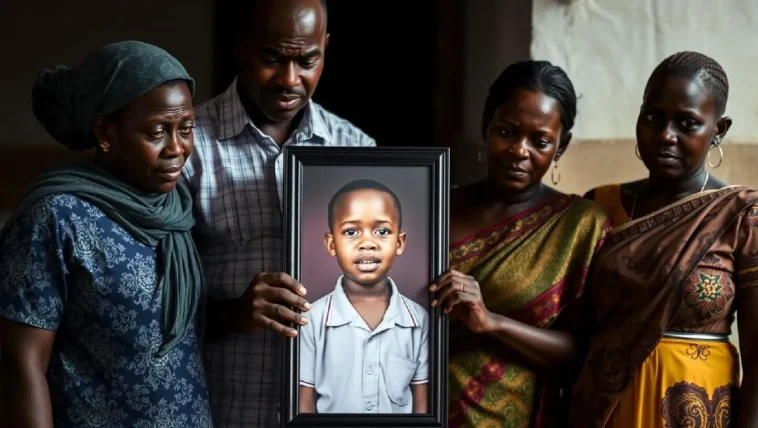Ibadan Teenager Killing
Outrage! Police Kill Ibadan Teenager – Family Demands Justice
Ibadan Teenager Killing: A police officer’s stray bullet tragically took the life of a teenager, sparking outrage and demands for justice.Wahala Burst: Police Officer Kill Ibadan Teenager
The ancient city of Ibadan is once again simmering with anger and grief. A stray bullet, allegedly fired by a police officer during a vehicle pursuit, has claimed the life of a young teenager, sending shockwaves through the community. Kehinde Alade, a bright 15-year-old student, was on his way to school when tragedy struck, turning a routine morning into a nightmare.
The incident, which occurred in the bustling Alakia-Gbagi area, has ignited protests and fueled long-standing frustrations over police brutality in Nigeria. The story is still developing, but one thing is clear: the people of Ibadan are demanding answers, and they are demanding justice.
As the news spread like wildfire, social media platforms became battlegrounds for outrage and calls for accountability. The hashtag #JusticeForKehinde quickly gained traction, with Nigerians from all walks of life expressing their solidarity with the grieving family and condemning the alleged actions of the police officer involved.
This is not an isolated incident. It’s a grim reminder of the deep-seated issues plaguing Nigeria’s law enforcement agencies. The question on everyone’s lips is: What exactly happened on that fateful morning, and what steps will be taken to ensure that such a tragedy never happens again?
Di Tori As E Shele: Wetin Family Tok
Odunayo Alade, the father of the deceased, recounts a harrowing tale of confusion and unwarranted violence. According to his account, he was driving his children to school when another vehicle struck his car from behind. In an attempt to avoid further collision, he reversed his vehicle, only to be met with gunfire from a police officer.
“I was taking my children to school when a car hit me from behind,” Mr. Alade explained, his voice heavy with grief. “I reversed to avoid any further incident, and suddenly, a police officer opened fire on my car. The bullet pierced through the vehicle and hit my son, Kehinde, who was sitting in the back seat.”
The bullet, he said, struck Kehinde in the back, causing a grievous wound that would ultimately prove fatal. The father’s testimony paints a picture of a chaotic and terrifying situation, where a minor traffic incident escalated into a senseless act of violence.
Mr. Alade’s account raises several critical questions. Why did the police officer resort to using firearms in what appeared to be a minor traffic dispute? Was there any justification for the use of lethal force? These are the questions that the family, and the community, are demanding answers to.
Police Own Mouth: Wetin Dem Dey Tok?
The Oyo State Police Command has offered a contrasting narrative, claiming that the officers involved suspected criminal activity or abduction. According to the police, the driver’s actions raised suspicion, leading to a chase. During the pursuit, a police corporal aimed at the vehicle’s tires in an attempt to immobilize it, but the bullet missed its intended target and struck the teenager in the back seat.
The police statement reads, “During the chase, one of the officers, in a bid to demobilize the vehicle, fired a shot at the tyres but unfortunately, the bullet strayed and hit one of the occupants.” This explanation has been met with skepticism and outrage from the public, many of whom find it difficult to believe that the shooting was accidental.
Critics argue that the police’s explanation is riddled with inconsistencies and raises more questions than it answers. Why did the officers deem it necessary to open fire on a vehicle occupied by children? Was there any evidence to suggest that a crime was being committed?
The Oyo State Commissioner of Police, CP Adebola Hamzat, has assured the public that a comprehensive investigation is underway, led by the Deputy Commissioner of Police, State Criminal Investigation Department. However, many remain unconvinced, citing a history of cover-ups and lack of accountability within the police force.
Eyewitnesses Confess: Wetin Dem See?
Eyewitness accounts corroborate the family’s version of events, further casting doubt on the police’s narrative. Several witnesses have confirmed that the police fired at the car during the chase, contradicting the claim that the shooting was accidental.
“I saw everything,” said a local trader who witnessed the incident. “The police were chasing the car, and they were shooting at it. It was clear that they were trying to stop the car by any means necessary.” Another witness added that the officer who fired the shot fled the scene, seeking refuge at a nearby Air Force base.
These eyewitness testimonies paint a disturbing picture of reckless and excessive use of force by the police. They also raise serious questions about the police’s commitment to transparency and accountability.
The credibility of these eyewitness accounts is crucial in determining the true sequence of events. Their testimonies challenge the police’s narrative and provide further evidence of potential misconduct.
Protest Gbas Gbos: Ibadan Youths Para
The **Ibadan Teenager Killing** has sparked widespread protests in the Alakia-Gbagi area, with residents demanding justice and accountability. The streets have been filled with angry youths, chanting slogans and carrying placards denouncing police brutality. The protests underscore the deep-seated frustration and anger that have been simmering beneath the surface for years.
The protesters are demanding that the officer responsible for the shooting be brought to justice and that concrete steps be taken to prevent similar incidents from happening in the future. They are also calling for a comprehensive reform of the police force, including better training, improved oversight, and stricter disciplinary measures.
The protests have been largely peaceful, but there have been reports of clashes between protesters and police. The police have been accused of using excessive force to disperse the crowds, further inflaming tensions.
The protests serve as a powerful reminder of the public’s growing impatience with police misconduct. They also highlight the urgent need for meaningful reforms to restore trust and confidence in law enforcement agencies.
Sowore Enter Matter: Human Rights Advocate Weighs In
Renowned human rights activist Omoyele Sowore has condemned the **Ibadan Teenager Killing**, linking it to a broader pattern of police brutality in Nigeria. Sowore has been a vocal critic of the Nigerian police force for years, accusing them of widespread corruption, abuse of power, and lack of accountability.
In a statement released on social media, Sowore lambasted the Inspector General of Police, Kayode Egbetokun, for failing to reform the force and prevent such tragedies. “This is yet another example of the impunity and recklessness that have become synonymous with the Nigerian police,” Sowore wrote.
Sowore’s criticism carries significant weight, given his long-standing advocacy for human rights and police reform. His comments add to the growing pressure on the authorities to take decisive action to address the root causes of police brutality in Nigeria.
His words serve as a rallying cry for activists and concerned citizens across the country, urging them to continue demanding justice and accountability from law enforcement agencies.
Family Demands: Wetin Dem Want?
The family of Kehinde Alade is understandably devastated by their loss. They have publicly demanded justice and accountability, calling on the authorities to ensure that the officer responsible for the shooting is brought to book. The emotional toll on the family is compounded by the fact that Kehinde was a twin, and his surviving sibling is now grappling with the unimaginable pain of losing his brother.
“We want justice,” said Mr. Alade, his voice trembling with emotion. “We want the police officer who killed my son to be arrested and prosecuted. We want to see him face the consequences of his actions.”
The family’s demands extend beyond the prosecution of the individual officer involved. They are also calling for systemic changes within the police force to prevent similar tragedies from happening in the future.
The family’s pain and suffering are a stark reminder of the human cost of police brutality. Their demands for justice resonate with countless Nigerians who have been victims of police misconduct.
Social Media Gbege: How Tori Take Blow
The **Ibadan Teenager Killing** quickly gained widespread attention on social media, with viral videos and images amplifying calls for justice and police reform. Platforms like Twitter, Facebook, and Instagram have been flooded with posts condemning the shooting and demanding accountability.
The power of social media in shaping public opinion and driving social change cannot be overstated. In this case, social media has played a crucial role in bringing the **Ibadan Teenager Killing** to the attention of a global audience, putting pressure on the authorities to take action.
The viral outrage has also sparked a broader conversation about police brutality in Nigeria, with many sharing their own experiences and demanding systemic reforms. The incident has become a rallying cry for activists and concerned citizens across the country.
Social media’s ability to amplify voices and mobilize action has made it an indispensable tool for holding power accountable and demanding justice.
Police Wahala: History of Police Brutality for Naija
The **Ibadan Teenager Killing** is not an isolated incident. It is part of a persistent problem of police violence and lack of accountability in Nigeria. Previous incidents and the #EndSARS movement have highlighted public frustration with police misconduct and the urgent need for systemic reform.
The #EndSARS movement, which gained momentum in 2020, was sparked by widespread anger over police brutality and extrajudicial killings. The protests, which were initially peaceful, were met with violent repression by the authorities, further inflaming tensions.
Despite promises of reform, little has changed since the #EndSARS movement. Police brutality remains a pervasive problem in Nigeria, with countless cases of abuse, extortion, and extrajudicial killings going unpunished.
The history of police brutality in Nigeria underscores the urgent need for fundamental reforms to restore trust and confidence in law enforcement agencies.
Di Legality: Wetin Di Law Tok?
The **Ibadan Teenager Killing** is likely to lead to civil claims against the police, renewed calls for independent oversight, and possible disciplinary or legal action against the officer involved. The outcome of the official investigation will be closely watched by both the public and advocacy groups.
Under Nigerian law, police officers are authorized to use force only when necessary and proportionate to the threat they face. The use of lethal force is justified only in cases of self-defense or to prevent a violent crime.
If the investigation reveals that the officer involved in the **Ibadan Teenager Killing** used excessive force, he could face criminal charges, including manslaughter or murder. He could also be subject to disciplinary action by the police force.
In addition to criminal and disciplinary proceedings, the family of Kehinde Alade could also file a civil lawsuit against the police for damages. A successful lawsuit could result in the payment of compensation to the family for their loss.
Community Grievances: How E Dey Affect Ibadan People?
The **Ibadan Teenager Killing** has heightened tensions between law enforcement and local communities in Ibadan, with residents expressing fear, anger, and mistrust toward the police. Community leaders and activists are calling for transparent investigations and meaningful reforms to restore public confidence.
The incident has further eroded the already fragile relationship between the police and the communities they are supposed to serve. Many residents feel that the police are more of a threat than a source of protection.
Community leaders are urging the police to engage in dialogue with residents and to address their concerns. They are also calling for increased transparency and accountability in policing practices.
Restoring trust and confidence in law enforcement agencies is essential for maintaining peace and security in Ibadan. This will require a concerted effort by the police, community leaders, and government officials.
Wetin Next? Di Future of Policing for Ibadan
The progress and transparency of the ongoing investigation, the outcome of any legal proceedings, and the implementation of promised reforms will be crucial in determining the long-term impact of this case on policing standards and public trust in Ibadan and Nigeria at large. The **Ibadan Teenager Killing** has brought the issue of police brutality to the forefront once again, and the authorities are under immense pressure to take meaningful action.
Some of the reforms that have been proposed include:
- Improving police training to emphasize de-escalation techniques and respect for human rights.
- Strengthening oversight mechanisms to ensure that police officers are held accountable for their actions.
- Increasing transparency in policing practices.
- Establishing independent bodies to investigate allegations of police misconduct.
Whether these reforms will be implemented remains to be seen. However, one thing is clear: the people of Ibadan, and Nigerians across the country, are watching closely. They are demanding change, and they will not rest until they see it.
The **Ibadan Teenager Killing** serves as a stark reminder of the urgent need for police reform in Nigeria. It is a call to action that cannot be ignored.
The tragic incident in Ibadan has once again ignited the debate around police accountability and the need for transparency in law enforcement. In a world increasingly reliant on visual evidence, many are questioning how technology can play a role in ensuring justice and preventing future tragedies. One potential solution gaining traction is the adoption of police body cameras.
Body cameras offer an objective record of interactions between officers and civilians, providing crucial evidence in cases of alleged misconduct. They not only protect citizens from abuse but also shield law enforcement personnel from false accusations, fostering a greater sense of trust and understanding between the police and the communities they serve. As we continue to grapple with the complexities of policing in Nigeria, it’s essential to explore all available tools that can promote fairness, transparency, and accountability.
Interested in learning more about how body cameras can revolutionize law enforcement and contribute to a safer, more just society? Explore our selection of top-rated police body cameras and discover how these devices are transforming policing around the world. Don’t forget to share your thoughts in the comments below and subscribe to the Naija NewsBurrow newsletter for the latest updates and in-depth analysis of the issues that matter most to you.
Shop Products On Amazon
Shop Products on Ebay









Trending Similar Stories in the News
Oyo APC seeks probe into death of Ibadan teenager MSN...
Trending Videos of Ibadan Teenager Killing
Police Stray Bullet Kills Boy In Ibadan+ Senator Urges Demolition Of Abuja Slum| WHAT’S TRENDING
Similar Popular Articles
#PoliceBrutality #Nigeria #Justice #Ibadan #EndSARS
Ibadan, Police Brutality, Teenager, Killing, Justice





💬 What’s your take? Drop a comment below! ⬇️
#BreakingNews #LatestUpdate #StayInformed
📖 Read More: https://honeydew-zebra-306959.hostingersite.com/ibadan-teenager-killing-police-brutality/
Outrage! Police Kill Ibadan Teenager – Family Demands Justice
💬 What’s your take? Drop a comment below! ⬇️
#BreakingNews #LatestUpdate #StayInformed
📖 Read More: https://tinyurl.com/2brpjjzo